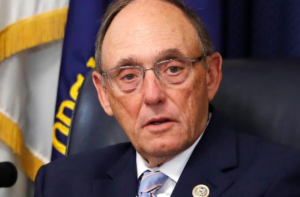By Jim Ellis

Arizona Senate candidate, retired astronaut Mark Kelly (D), and Sen. Martha McSally (R)
PPP also ran ballot tests involving President Trump paired individually against the major Democratic presidential contenders. Even though Arizona is a critical state in the 2020 presidential general election, the early projection numbers are not particularly salient because the contest has yet to begin in earnest, but the Trump results do provide a credibility foundation to analyze the PPP Senate numbers.
The Senate ballot test shows, as does every other previous survey of this race, that the McSally-Kelly battle is within the polling margin of error. The PPP numbers, at 46-42 percent in Kelly’s favor, project a four-point spread between the candidates, which is a bit more separation than revealed in past Arizona surveys.
Both Kelly and McSally have been near the top of national Senate fundraising charts, so it is clear that each will have plenty of resources to communicate their specific campaign messages in addition to expected independent expenditures that will come into the state to aid and attack both candidates. It is already clear that the Arizona Senate race will become a national campaign.
At this point, the Grand Canyon State campaign looks to be the Democrats’ best conversion opportunity, and a victory for them becomes even more important to offset what is likely a predicted loss for Sen. Doug Jones (D) in Alabama. With the Democrats needing a net gain of at least three seats, or four depending upon the presidential race outcome, every swing seat becomes critical for both parties.

 Jan. 9, 2020 — The Mason-Dixon Polling & Strategy company surveyed the Georgia electorate to test President Donald Trump’s approval rating after being impeached in the House and, as in several other places, his Peach State standing appears slightly better today than it was in the previous year.
Jan. 9, 2020 — The Mason-Dixon Polling & Strategy company surveyed the Georgia electorate to test President Donald Trump’s approval rating after being impeached in the House and, as in several other places, his Peach State standing appears slightly better today than it was in the previous year.


 Jan. 3, 2020 — The Census Bureau just released its new population growth estimates for the 12-month period between July 1, 2018 and July 1, 2019. Their data allows us to assess just which states will likely gain and lose congressional districts in 2020 reapportionment, both in terms of the real numbers just presented and for projecting the final count once the decade’s final-year patterns are calculated and the census is actually conducted.
Jan. 3, 2020 — The Census Bureau just released its new population growth estimates for the 12-month period between July 1, 2018 and July 1, 2019. Their data allows us to assess just which states will likely gain and lose congressional districts in 2020 reapportionment, both in terms of the real numbers just presented and for projecting the final count once the decade’s final-year patterns are calculated and the census is actually conducted. By Jim Ellis
By Jim Ellis